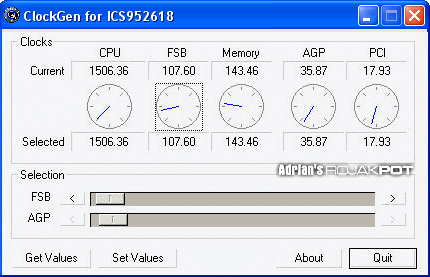Overclocking The Banias
With the M30, we immediately noted that we were not able to manually control the AGP clock speed. We were only able to adjust the FSB clock speed. Everything else was overclocked together with the FSB.
We started with a slight boost in FSB speed, from 100MHz to 107.6MHz. This allowed us to overclock the Pentium M processor to 1.5GHz. At this point, we ran some benchmarks to test its performance as well as its stability.

We then pushed it further to 1.6GHz with a FSB speed of 114.55MHz. It held up well at 1.6GHz, even duing our stress tests.

We made another big push to 1.7GHz using the FSB speed of 121.47MHz. We are happy to report that the Banias processor didn't have a problem even at 1.7GHz.

We then made a final push to 1.75GHz and tested its stability. Again, it didn't fail any of the tests. However, we didn't dare to go much further than a 25% boost in FSB speed. Why? Let's take a look.
PCI Bus Speed
One thing that many people forget is the PCI bus speed. In the case of the Toshiba M30's motherboard, the PCI bus is not locked at the standard clock speed of 33.3MHz. Rather, it increases together with increases in the FSB clock speed.
We confirmed this by running HDTach. Here are the results :
|
Processor Speed |
PCI Bus Speed |
Read Burst Speed (MB/s) |
Difference (MB/s) |
1.40 GHz |
33.33 MHz |
88.1 |
- |
1.50 GHz |
35.86 MHz |
89.2 |
+ 1.1 |
1.60 GHz |
38.18 MHz |
89.7 |
+ 0.5 |
The media read speed is ignored as it remains the same no matter how fast the PCI bus is. As we push the FSB speed (and consequently the processor speed), the PCI bus speed increases as well. This is reflected in the higher read burst speed.
The trouble with an excessively high PCI bus speed is the possibility of corrupting data on the hard disk. If your processor crashes when you overclock it, you can easily downclock it - no harm done. But if data on your hard disk becomes corrupted as a result of an overclocked PCI bus, that's usually permanent - your data is lost forever.
So, it is highly advisable not to overclock the PCI bus too much. Generally, most hard disks should be able to withstand PCI bus speeds of up to 37.5MHz. Some can even run at 41.5MHz. However, anything beyond that is really risky. That's why we only tested up to the FSB speed of 125MHz. At that FSB speed, the PCI bus would be running at 41.6MHz.







 Add to Reddit
Add to Reddit
